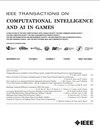利用进化模型在迭代囚徒困境竞赛中获胜
Q2 Computer Science
IEEE Transactions on Computational Intelligence and AI in Games
Pub Date : 2016-09-01
DOI:10.1109/TCIAIG.2015.2439061
引用次数: 10
摘要
迭代囚徒困境是博弈论中一个著名的合作与冲突模型。它的起源可以追溯到冷战时期,到目前为止,人们提出了无数的下棋策略,有的是手工设计的,有的是电脑自动生成的。在2000年代,学者们开始关注适应性玩家,即能够对对手的行为进行分类并采取有效的对抗策略的玩家。本文所呈现的玩家进一步推动了这一理念:它从头开始构建当前对手的模型,而不依赖于任何预先定义的原型,并随着游戏的发展使用进化算法对其进行调整;同时利用这一模式将游戏引向最有利的延续。模型是紧凑的不确定性有限状态机;它们在预测对手的回答方面非常有效,而不必完全正确。实验结果表明,这样的玩家能够在与文献中的强大对手的一对一比赛中获胜,并且在不同规模的循循赛中始终占上风。本文章由计算机程序翻译,如有差异,请以英文原文为准。
Exploiting Evolutionary Modeling to Prevail in Iterated Prisoner’s Dilemma Tournaments
The iterated prisoner's dilemma is a famous model of cooperation and conflict in game theory. Its origin can be traced back to the Cold War, and countless strategies for playing it have been proposed so far, either designed by hand or automatically generated by computers. In the 2000s, scholars started focusing on adaptive players, that is, able to classify their opponent's behavior and adopt an effective counter-strategy. The player presented in this paper, pushes such idea even further: it builds a model of the current adversary from scratch, without relying on any pre-defined archetypes, and tweaks it as the game develops using an evolutionary algorithm; at the same time, it exploits the model to lead the game into the most favorable continuation. Models are compact nondeterministic finite state machines; they are extremely efficient in predicting opponents' replies, without being completely correct by necessity. Experimental results show that such a player is able to win several one-to-one games against strong opponents taken from the literature, and that it consistently prevails in round-robin tournaments of different sizes.
求助全文
通过发布文献求助,成功后即可免费获取论文全文。
去求助
来源期刊

IEEE Transactions on Computational Intelligence and AI in Games
COMPUTER SCIENCE, ARTIFICIAL INTELLIGENCE-COMPUTER SCIENCE, SOFTWARE ENGINEERING
CiteScore
4.60
自引率
0.00%
发文量
0
审稿时长
>12 weeks
期刊介绍:
Cessation. The IEEE Transactions on Computational Intelligence and AI in Games (T-CIAIG) publishes archival journal quality original papers in computational intelligence and related areas in artificial intelligence applied to games, including but not limited to videogames, mathematical games, human–computer interactions in games, and games involving physical objects. Emphasis is placed on the use of these methods to improve performance in and understanding of the dynamics of games, as well as gaining insight into the properties of the methods as applied to games. It also includes using games as a platform for building intelligent embedded agents for the real world. Papers connecting games to all areas of computational intelligence and traditional AI are considered.
 求助内容:
求助内容: 应助结果提醒方式:
应助结果提醒方式:


